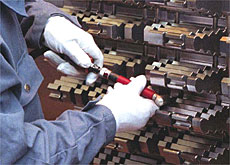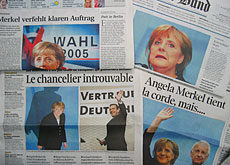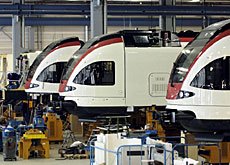Swiss business fears German power vacuum

Swiss business leaders have expressed concern about the uncertain outcome of the election in Germany, Switzerland's most important trading partner.
They also warn of the consequences for the Swiss economy if the next German government does not pick up the pace of reform.
Both Gerhard Schröder of the ruling Social Democratic Party and opposition candidate Angela Merkel from the Christian Democratic Union have claimed victory in the polls.
But neither politician has won enough seats to form a government with traditional allies and experts predict the task of forging a coalition could take weeks.
Aymo Brunetti, chief economist at the Swiss State Secretariat for Economic Affairs, said the uncertainty now prevailing in Germany was “not useful”.
The Swiss Business Federation, economiesuisse, takes a similar view. Its chief economist, Rudolf Walser, said the German vote was unlikely to have any “immediate impact” on the state and future direction of economic ties between the two countries.
But he conceded that it would have been in Switzerland’s interests as a trading partner with Germany for the result to have been more clear-cut.
Fear of reform
According to Walser, Sunday’s vote “shows that the German people are afraid [of implementing reform]”.
Other leading Swiss economists believe that one of the consequences of a consensus-led government – whichever party emerges as the driving force behind a workable coalition – is likely to be less impetus to push through painful reform.
Janwillem Acket, chief economist at Swiss bank Julius Bär, said that the art of striking political compromise would inevitably “water down” economic-reform policy.
He added that political confusion in Germany was “also bad for Switzerland” since the Swiss and German economies were “very closely linked”.
Analysts at UBS – Switzerland’s largest bank – maintain that “whichever parties make up a coalition”, reform in Germany is likely either to slow down or come to a complete standstill.
“Worst result imaginable”
Swiss politicians have expressed fears that the inconclusive election result is likely to stop the reform process across the border dead in its tracks.
Parliamentarian Peter Briner, president of the Senate’s foreign-policy commission, said the verdict at the polls was the “worst result imaginable”.
The Swiss government has made no official comment on the result, but the European Union called for a quick end to the political deadlock.
European Commission President Jose Manuel Barroso said on Monday that he had a “duty… to urge German political leaders to come as soon as possible to a solution that is stable for Europe”.
For its part, the German Chamber of Industry and Commerce has urged politicians in Berlin to form a stable government that recognises the need to tackle Germany’s economic problems.
Earlier this year the number of unemployed in Germany hit a post-war high of 5.2 million. The jobless rate currently stands at 11.4 per cent. In Switzerland, the rate is 3.6 per cent.
swissinfo with agencies
Germany is Switzerland’s most important trading partner.
Twenty per cent of Swiss exports (totalling SFr45.5 billion in 2004) head to Germany and a third of Switzerland’s imports (totalling SFr29.8 billion in 2004) come from its northern neighbour.
Germany is a key player in the Swiss machine, metal and pharmaceutical industries.
Germans account for every third Swiss hotel bed occupied by a foreigner.

In compliance with the JTI standards
More: SWI swissinfo.ch certified by the Journalism Trust Initiative


You can find an overview of ongoing debates with our journalists here . Please join us!
If you want to start a conversation about a topic raised in this article or want to report factual errors, email us at english@swissinfo.ch.